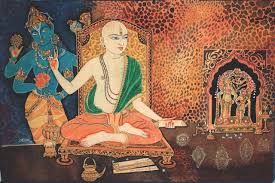The Vedanta philosophy, as it is generally called at the present day, really comprises all the various sects that now exist in India. Thus there have been various interpretations, and to my mind they have been progressive, beginning with the dualistic or Dvaita and ending with the non-dualistic or Advaita. The word Vedanta literally means the end of the Vedas — the Vedas being the scriptures of the Hindus.1 Sometimes in the West by the Vedas are meant only the hymns and rituals of the Vedas. But at the present time these parts have almost gone out of use, and usually by the word Vedas in India, the Vedanta is meant. All our commentators, when they want to quote a passage from the scriptures, as a rule, quote from the Vedanta, which has another technical name with the commentators — the Shrutis. (The term Shruti — meaning "that which is heard" — though including the whole of the Vedic literature, is chiefly applied by the commentators to the Upanishads.) Now, all the books known by the name of the Vedanta were not entirely written after the ritualistic portions of the Vedas. For instance, one of them — the Ishâ Upanishad — forms the fortieth chapter of the Yajur-Veda, that being one of the oldest parts of the Vedas. There are other Upanishads2which form portions of the Brahmanas or ritualistic writings; and the rest of the Upanishads are independent, not comprised in any of the Brahmanas or other parts of the Vedas; but there is no reason to suppose that they were entirely independent of other parts, for, as we well know, many of these have been lost entirely and many of the Brahmanas have become extinct. So it is quite possible that the independent Upanishads belonged to some Brahmanas, which in course of time fell into disuse, while the Upanishads remained. These Upanishads are also called Forest Books or Aranyakas.
The Vedanta, then, practically forms the scriptures of the Hindus, and all systems of philosophy that are orthodox have to take it as their foundation. Even the Buddhists and Jains, when it suits their purpose, will quote a passage from the Vedanta as authority. All schools of philosophy in India, although they claim to have been based upon the Vedas, took different names for their systems. The last one, the system of Vyâsa, took its stand upon the doctrines of the Vedas more than the previous systems did, and made an attempt to harmonise the preceding philosophies, such as the Sânkhya and the Nyâya, with the doctrines of the Vedanta. So it is especially called the Vedanta philosophy; and the Sutras or aphorisms of Vyasa are, in modern India, the basis of the Vedanta philosophy. Again, these Sutras of Vyasa have been variously explained by different commentators. In general there are three sorts of commentators3 in India now; from their interpretations have arisen three systems of philosophy and sects. One is the dualistic, or Dvaita; a second is the qualified non-dualistic, or Vishishtâdvaita; and a third is the non-dualistic, or Advaita. Of these the dualistic and the qualified non-dualistic include the largest number of the Indian people. The non-dualists are comparatively few in number. Now I will try to lay before you the ideas that are contained in all these three sects; but before going on, I will make one remark — that these different Vedanta systems have one common psychology, and that is, the psychology of the Sankhya system. The Sankhya psychology is very much like the psychologies of the Nyaya and Vaisheshika systems, differing only in minor particulars.

No comments:
Post a Comment